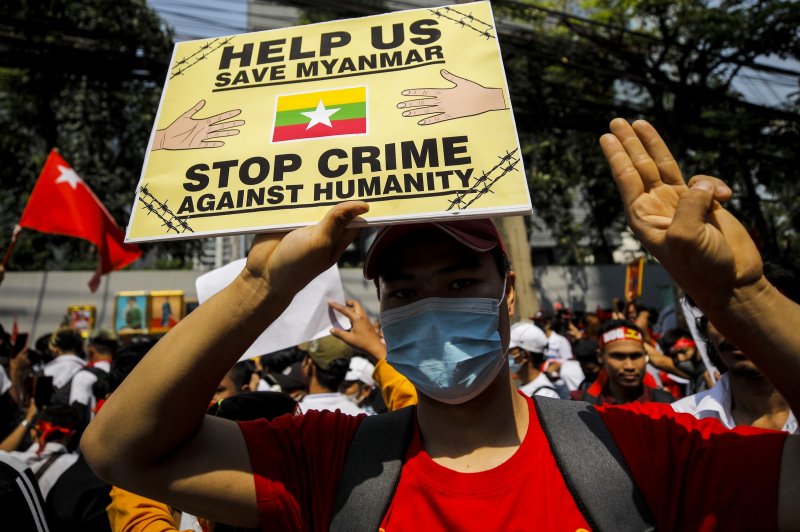The European Union imposed a slew of sanctions on Monday targeting nine people and seven entities connected to the ruling Myanmar government. Photo by Diego Azubel/EPA-EFE
Feb. 21 (UPI) -- The European Union imposed its sixth round on sanctions targeting the government of Myanmar on Monday, as the junta continues to commit violence against its citizens.
The European Council, the union's collegiate body, adopted measures on Monday to blacklist nine people and seven entities on accusations that they have aided the junta government in threatening the peace and stabilizing of the country.
Myanmar's Union Energy Minister Myo Myint Oo, prominent arms brokers and high-ranking military officers were sanctioned Monday, along with departments of the defense ministry and a state-owned enterprise under its jurisdiction as well as private companies supplying the military with fuel, arms and funds.
Sanctions also targeted Yangon Region politicians and administrators, including Lt. Col. Myo Mint Aung, who is accused of serving as a military judge involved in handing down the death sentences and execution of anti-coup activists Kyaw Min Yu, Phyo Zeya Thaw, Hla Myo Aung and Aung Thura Zaw in July.
The United Nations said their executions were the first to be committed in the country since 1988.
According to the statement of reason for blacklisting Aung, the EU said that during "his tenure as military judge, numerous members of the opposition were sentenced to death and prison terms."
Major Gen. Ko Ko Maung, regional military commander in Kachin State, located in northern Myanmar, was also sanctioned Monday for overseeing air strikes, massacres, raids, arson and "the use of human shields committed by the military," according to the EU.
In October, an airstrike killed some 80 people and injured 100 more at a music festival in Kachin.
The sanctions come weeks after the two-year anniversary of the junta seizing control of the country in a coup on Feb. 1, 2021.
On that day, military overthrew the democratically elected government of Aung San Suu Kyi, who was arrested, and installed its ruling State Administration Council regime.
The coup sparked mass protests, which the junta has met with bloody force. According to the Thailand-based Assistance Association for Political Prisoners, more than 3,000 people have been killed by the junta and nearly 20,000 have been arrested.
Since coup, some 1.5 million citizens have been internally displaced across the country, the United Nations human rights office said in late December, adding that more than 34,000 civilian properties have been destroyed in the last two years,
Activist group Justice for Myanmar said that while the latest blacklisting fills gaps in its previous sanctions regime targeting the junta government, further restrictive measures are needed.
"While these latest sanctions are a positive step in cutting the junta's access to resources, far more needs to be done to coordinate sanctions that systematically target the junta's sources of revenue, arms and jet fuel," Justice for Myanmar spokesperson Yadanar Maung said in a statement.
Since the coup, Western nations, including the United States, Australia, Britain and Canada, have responded with sanctions against Myanmar, most recently as a coalition late last month.
But activists are saying they need to go further and be deployed with greater urgency.
"The EU has the right approach, but they are moving too slowly to implement these sanctions," Burma Campaign UK said in a statement Monday. "The delay in cutting off sources of revenue, arms and equipment is costing lives."
Including sanctions announced Monday, the EU has imposed asset freezes and travel bans on 93 people and 18 entities involved in Myanmar's ruling junta.















